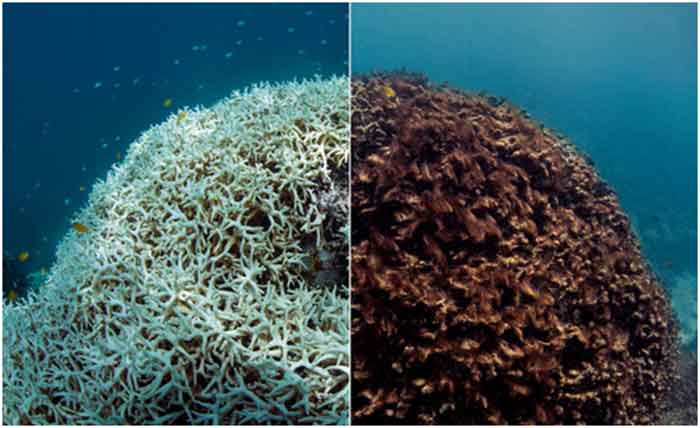
Every one of the world’s coral reefs could bleach by the end of the century, unless there are drastic reductions in greenhouse-gas emissions, the United Nations Environment Programme (UNEP) has warned.
Coral reefs are incredibly important and sustain a wide variety of marine life. They also protect coastlines from erosions from waves and storms, sink carbon and nitrogen and help recycle nutrients.
Their loss would have devastating consequences not only for marine life, but also for over a billion people globally who benefit directly or indirectly from them.
Coral bleaching
When water temperatures rise, corals expel the vibrant microscopic algae living in their tissues. This phenomenon is called coral bleaching. Though bleached corals are still alive and can recover their algae, if conditions improve. However, the loss puts them under increased stressed, and if the bleaching persists, the corals die.
The last global bleaching event started in 2014 and extended well into 2017. It spread across the Pacific, Indian and Atlantic oceans, and was the longest, most pervasive and destructive coral bleaching incident ever recorded.
In its report Projections of Future Coral Bleaching Conditions, UNEP outlines the links between coral bleaching and climate change. It postulates two possible scenarios: a “worst-case scenario” of the world economy heavily driven by fossil fuels; and a “middle-of-the-road” wherein countries exceed their current pledges to limit carbon emissions by 50 per cent.
Under the fossil-fuel-heavy scenario, the report estimates that every one of the world’s reefs will bleach by the end of the century, with annual severe bleaching occurring on average by 2034, nine years ahead of predictions published three years ago.
This would mark the point of no return for reefs, compromising their ability to supply a range of ecosystem services, including food, coastal protection, medicines and recreation opportunities, the report warns.
Should countries achieve the “middle-of-the-road” scenario, severe bleaching could be delayed by eleven years, to 2045, adds UNEP.
According to UNEP, while it is not known exactly how corals acclimate to changing temperatures, the report examines the possibility of these adaptations assuming between 0.25 degree Celsius and 2 degrees Celsius of warming.
It found that every quarter degree of adaption leads to a possible seven-year delay in projected annual bleaching: that means corals could receive a 30-year reprieve from severe bleaching if they can adapt to 1 degree Celsius of warming.
However, if humanity keeps up with its current greenhouse-gas emissions, corals will not survive even with 2 degrees Celsius of adaptation.
‘More dire than before’
Report’s lead author Ruben van Hooidonk, a coral researcher with America’s National Oceanic and Atmospheric Administration (NOAA), said, “The sad part is that the projections are even more dire than before.”
“It means we really need to try to reduce our carbon emissions to save these reefs. This report shows that we need to do it even more urgently and take more action because it’s even worse than what we thought.”
“What this shows is even with the adaptation, we need to reduce our emissions to buy time for those locations (where) we can do restoration efforts and keep corals alive,” said Mr. van Hooidonk.
“In the face of inaction, coral reefs will soon disappear,” Leticia Carvalho, head of UNEP’s Marine and Freshwater Branch said on Monday.
“Humanity must act with evidence-based urgency, ambition and innovation to change the trajectory for this ecosystem, which is the canary in the coalmine for climate’s impact on oceans, before it’s too late.”
SIGN UP FOR COUNTERCURRENTS DAILY NEWSLETTER














































